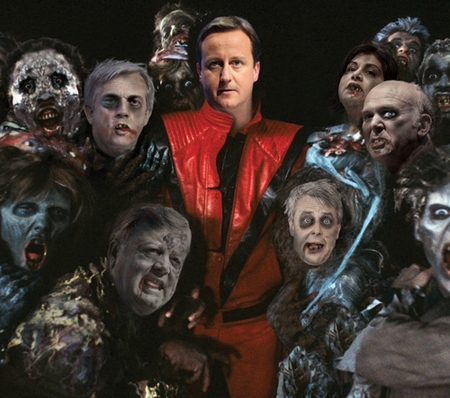 CoffeeHousers raised some very good points about my post on Cameron’s undead ministers. I thought I’d reply in a post, rather than the comments thread.
CoffeeHousers raised some very good points about my post on Cameron’s undead ministers. I thought I’d reply in a post, rather than the comments thread.
1. About the ‘undead’. Cameron leads a radical government of surprisingly competent people: the ambitious tasks of welfare and school reform are testimony to how far he is moving. Cameron’s policy is to delay a reshuffle for as long as he can. While Blair did reshuffle a lot, he tried his best not to do so to satisfy the media headlines. This is when the concept of undead ministers first arose. You’d have people like Geoff Hoon in defence and Stephen Byers in transport, who obviously had to go — but Blair would wait until the media stopped saying so. Meanwhile, they were regarded by other Cabinet members as for the chop. I’m not necessarily talking about whom I think should quit, just about those who are seen as doomed.
2. Who deserves to go? Of the five that I mentioned, two deserve to go: Cable, for his endless stirring against the coalition he purports to support. Lansley, for having made an unforgivable Horlicks of NHS reform and thinking his job is about policy, not politics. Caroline Spelman I think should stay: her forest plan was sound. She needed more help defending herself against the attack, and the (then) No10 operation was too quick to blame her and too slow to help out. But I’m afraid she is spoken of by her fellow Cabinet members as being for the chop. Chris Huhne will have to resign if he is interviewed under caution for the speeding offence: that’s the rules. So why is Ken ‘undead?’ Because as James Forsyth revealed on Wednesday, those around Cameron and Osborne are letting it be known that they ‘can’t wait to see the back of him’.
3. About Ken Clarke. What he said about rape was bad, but not a resignation offence. My collague Freddy Gray said so on Thursday and the latest YouGov poll indicates that punters agree. When Clarke was asked about degrees of rape, he spoke as the lawyer he is — temporarily forgetting he’s a politician. But his greater problem is making Labour be seen as the party of law and order — closing prisons, when the Tories fought an election campaign attacking Labour for releasing prisoners early:

Nick Clegg gets a hard time about the tuition fee policy reverse, but the Conservatives ought to be reminded of the election poster “I let 80,000 criminals out early — vote for me.” Clegg had an excuse: coalition. Why did the Tories go back on their word? There isn’t really a proper answer.
The anger does not come from the red tops (Davey L.S) but from their readers, who are disproportionately the victims of crime and who tend to decide British general elections. They’re the ones Cameron is heeding. And as for Clarke’s prisons and their efficacy (Jane), we have some more statistics for you – here’s a leader I wrote for the magazine a while back. And Theodore Dalrymple, a former prison doctor, gives his view here.
4. Reasons to be cheerful about Cameron. Austin Barry questions my characterisation of the government. As we prepare for another installation of the Big Society, it’s easy to get downhearted about this government and lose sight of the far more encouraging overall narrative. I know I disappoint some CoffeeHousers by not being a very good party political kind of person: I admire reformers in all parties. But in this government I do see the best bits of all three parties: New Labour’s reform agenda implemented using classic liberal arguments (best articulated by Clegg) and led by a PM who — as Peter Oborne argued recently — could yet join Thatcher in the league of greats.
Look at its schools reform: about one in six state schools are now independent. This time last year it was one in 16. A welfare revolution has been coherently laid out and embarked upon. Cameron’s decision to stop a Srebrenica in Benghazi was a reminder that Britain is a country that seeks to shape the world, not be shaped by it. The university move is more radical than even I am comfortable with, but it has taken us to the marketization of higher education and will hopefully see the closure of dodgy courses which serve neither students nor society. George Osborne has room for more ambitious savings (finding cuts of 0.6 per cent in 2011-12 total spending hardly qualifies as radical). But he’s making the argument well, and winning against Labour.
What the government is getting right far outweighs what it’s getting wrong. And that’s not something we’ve been able to say for some time.







Comments